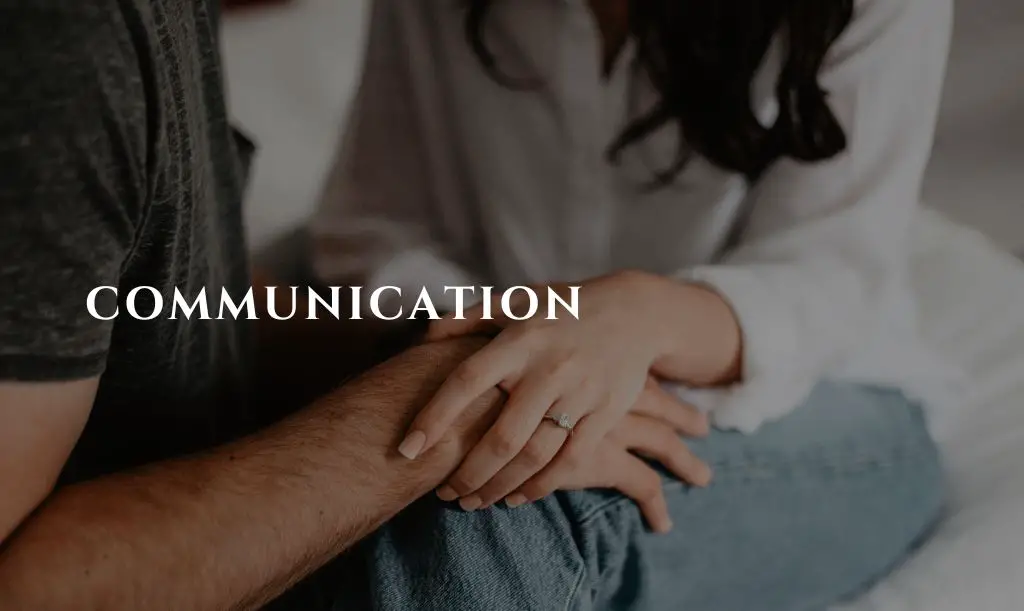‘Why does my wife get mad when I touch her? Find out in this comprehensive article!
In my experience, marriage is a labyrinth where emotions collide, communication falters, and misunderstandings breed like rabbits.
And nestled within this complex maze lies an enigma that plagues countless husbands: why does my wife get mad when I touch her?
It is a question that often leaves men scratching their heads in bewilderment, desperately seeking answers to unravel this perplexing mystery.
Read this: The 3 mistakes that lead to divorce (it’s not too late – read this)
Understanding Personal Boundaries

Personal boundaries are the invisible force fields that surround each individual, dictating the level of physical proximity they are comfortable with.
It’s a fascinating dance between personal preferences and societal norms.
What some may consider an innocent gesture of affection, others may find intrusive or unwelcome.
As spouses, we must navigate this intricate web of comfort zones and personal space to maintain a harmonious relationship.
Examining The Spectrum Of Individual Boundaries
Boundaries are not a one-size-fits-all concept; they exist on a vast spectrum that varies from person to person.
Some individuals have wide-open doors, inviting closeness and touch with open arms.
Others have more rigid boundaries, requiring ample space and privacy to feel secure in their own skin.
It is imperative that we recognize this spectrum and respect where our partner falls on it.
We must understand that just because we are comfortable being touched in certain ways or at certain times doesn’t mean our spouse shares the same sentiment.
It is not an attack on our character or an indication of their love for us; it simply highlights our differences as unique individuals.
Recognizing The Importance Of Mutual Respect
Respect forms the bedrock upon which any successful marriage is built, especially when it comes to physical boundaries.
We must acknowledge that no matter how much we desire physical affection, our partner’s consent and comfort should always be paramount.
Mutual respect means honoring their wishes and actively listening when they express discomfort or ask for space.
It means understanding that their body belongs to them alone, even within the bonds of marriage.
True intimacy can only flourish when both partners feel seen, heard, and valued.
Read this: Don’t give up on your marriage until you’ve tried this
Communication is Key

In the intricate dance of relationships, communication reigns supreme as the ultimate catalyst for understanding and harmony.
It is through open and honest dialogue that we can hope to unravel the perplexing question of why your beloved wife becomes enraged when you dare to touch her.
Words, my dear reader, hold immeasurable power.
The key lies not only in what is said but also in how it is conveyed.
Clear and respectful communication paves the way for a deeper connection, bridging the gap between partners with empathy and compassion.
Exploring Verbal And Non-Verbal Cues For Consent And Comfort
Communication encompasses more than just spoken words; it extends to non-verbal cues that convey consent or discomfort.
Pay heed to your wife’s subtle gestures, her facial expressions, and body language.
These are windows into her unspoken desires, fears, or even moments of vulnerability.
Be attentive to signals that indicate her readiness or reluctance for physical touch.
Encouraging Open Dialogue About Personal Preferences And Desires
We must shed our inhibitions and embark on a journey of discovery together – one that spells out personal preferences explicitly.
Engage your wife in heartfelt conversations where she can comfortably voice her needs without fear of judgment or shame.
This sacred space will allow both partners to explore boundaries while building trust brick by brick.
Read this: Marriage ‘on the rocks’? Read this ASAP
Emotional Factors at Play

Subconsciously embedded within the intricate tapestry of human emotions lie the enigmatic triggers that can turn a seemingly innocent touch into an explosion of fury.
It is imperative to comprehend these emotional factors that lurk beneath the surface, waiting to be unearthed.
Only by exploring and understanding these deep-rooted triggers can we hope to navigate the delicate landscape of physical intimacy with our partners.
Understanding Emotional Vulnerability And Its Impact On Intimacy
Emotional vulnerability lies at the heart of every intimate relationship, acting as both a catalyst for connection and a breeding ground for insecurities.
When it comes to touch, vulnerability is heightened, exposing individuals to fears of rejection, judgment, or even ridicule.
One must recognize the immense courage required to open oneself up physically and emotionally.
By fostering an environment of trust and empathetic communication, partners can navigate this delicate terrain together.
As we delve into the complexities of emotional factors at play in the realm of physical touch within marriage, it becomes evident that our reactions are not merely arbitrary outbursts but are deeply rooted in our past experiences and personal beliefs.
To unravel this mystery requires patience, empathy, and a willingness to engage in open dialogue with our partners.
Only then can we hope to bridge the divide between understanding and building truly intimate connections.
Read: Is your spouse considering a divorce?
Watch this:
Love Languages and Physical Touch
When it comes to matters of the heart, understanding the intricacies of love languages can be the key to unlocking a deeper connection with your spouse.
Gary Chapman’s groundbreaking concept of love languages has shed light on the various ways individuals express and receive affection.
By recognizing that each person has a dominant love language, we can begin to decipher why your wife may react negatively when you touch her.
Perhaps physical touch is not her primary way of feeling loved and valued.
The Five Love Languages By Gary Chapman: Words, Acts, Gifts, Time, Touch
Chapman’s framework identifies five primary love languages:
- Words of affirmation
- Acts of service
- Receiving gifts
- Quality time
- Physical touch.
While your instinctual way of expressing affection might involve physical touch as an expression of intimacy and connection, it is essential to recognize that this may not resonate with your wife in the same way.
She might derive more satisfaction from hearing words of affirmation or experiencing quality time together.
Hence why she may become upset when you initiate physical contact without considering her preferred love language.
To better understand your wife’s reaction towards physical touch, it is crucial to assess both your own and her dominant love language(s).
Engage in open and honest conversations about what actions or expressions make each other feel most loved and cherished.
This will require vulnerability but will foster a deeper understanding between you both.
By identifying each other’s primary love languages, you can navigate through potential pitfalls that arise when one partner feels unloved due to mismatched communication styles.
Nurturing Compatibility Through Understanding Each Other’s Needs
By delving into the intricacies of differing love languages within your relationship, you can nurture compatibility and build a stronger foundation of understanding.
Recognizing that your wife may feel more loved through acts of service or words of affirmation, for example, allows you to prioritize these expressions over physical touch.
It is essential to strike a balance between both partners’ needs and communicate openly about the importance of physical touch in maintaining intimacy.
By actively working towards meeting each other’s emotional needs, you can create a harmonious environment that reduces tension and fosters a deeper connection.
The concept of love languages provides valuable insights into why your wife may become upset when you touch her.
By recognizing the dominant love languages within your relationship and taking steps to prioritize each other’s needs, you can bridge the gap in understanding and foster a more fulfilling intimate connection.
Remember, it is crucial to approach this journey with empathy, active listening, and an unwavering commitment to strengthening your bond as life partners.
Read: Don’t give up on your marriage until you’ve tried this
Hormonal Influences on Physical Intimacy

Physical intimacy is a complex dance influenced by a myriad of factors, both internal and external.
Among these factors, hormones play a significant role in shaping our reactions to touch and affection.
Understanding the interplay between hormones and touch response can shed light on why your wife may react negatively when you attempt to initiate physical contact.
Oxytocin – “The Love Hormone” – Bonding Through Touch
Oxytocin is often referred to as “the love hormone.”
Its presence in our bodies can evoke warm feelings of connection and bonding.
Oxytocin levels surge during moments of physical touch, such as hugging or holding hands, fostering trust and closeness.
While it’s true that oxytocin promotes feelings of attachment and love, its effects can vary from person to person.
Factors such as past experiences and individual biology shape how we respond to this wondrous hormone.
Your wife’s unique emotional makeup may influence how her body processes oxytocin, leading to unexpected reactions when you attempt physical contact.
Why Does My Wife Get Mad When I Touch Her: Conclusion
In unraveling the complex reasons behind why your wife may get mad when you touch her, it’s crucial to consider a variety of factors.
Personal boundaries, communication, emotional triggers, and hormones all intertwine to shape our intimate experiences.
While it might be easy to feel frustrated or disappointed by your wife’s reactions, it’s important to approach these situations with empathy and understanding.
By making an effort to have open and honest conversations about each other’s needs and desires, you can create a safe space for both of you to explore physical intimacy in a way that respects personal boundaries.
Remember that every individual is unique and deserving of respect for their emotions and responses.
With patience and mutual understanding, you can work together towards building a stronger, more intimate connection.
So, instead of dwelling on the frustration or confusion surrounding this issue, let this be an opportunity for growth in your relationship.
Embrace the challenges as opportunities for deeper understanding and find comfort in knowing that through honest communication and empathy, you can forge a path towards greater physical intimacy with your wife.
Related Articles:
- https://lovebridgeguides.com/my-husband-bought-a-car-without-consulting-me/
- https://lovebridgeguides.com/wife-texting-male-coworker/
- Does A Prom Date Mean Anything? (Answered!) - 20 February 2024
- Boyfriend Refers To Me In Third Person (Explained!) - 20 February 2024
- Is Sending Memes Flirting? Find Out Here! - 20 February 2024


